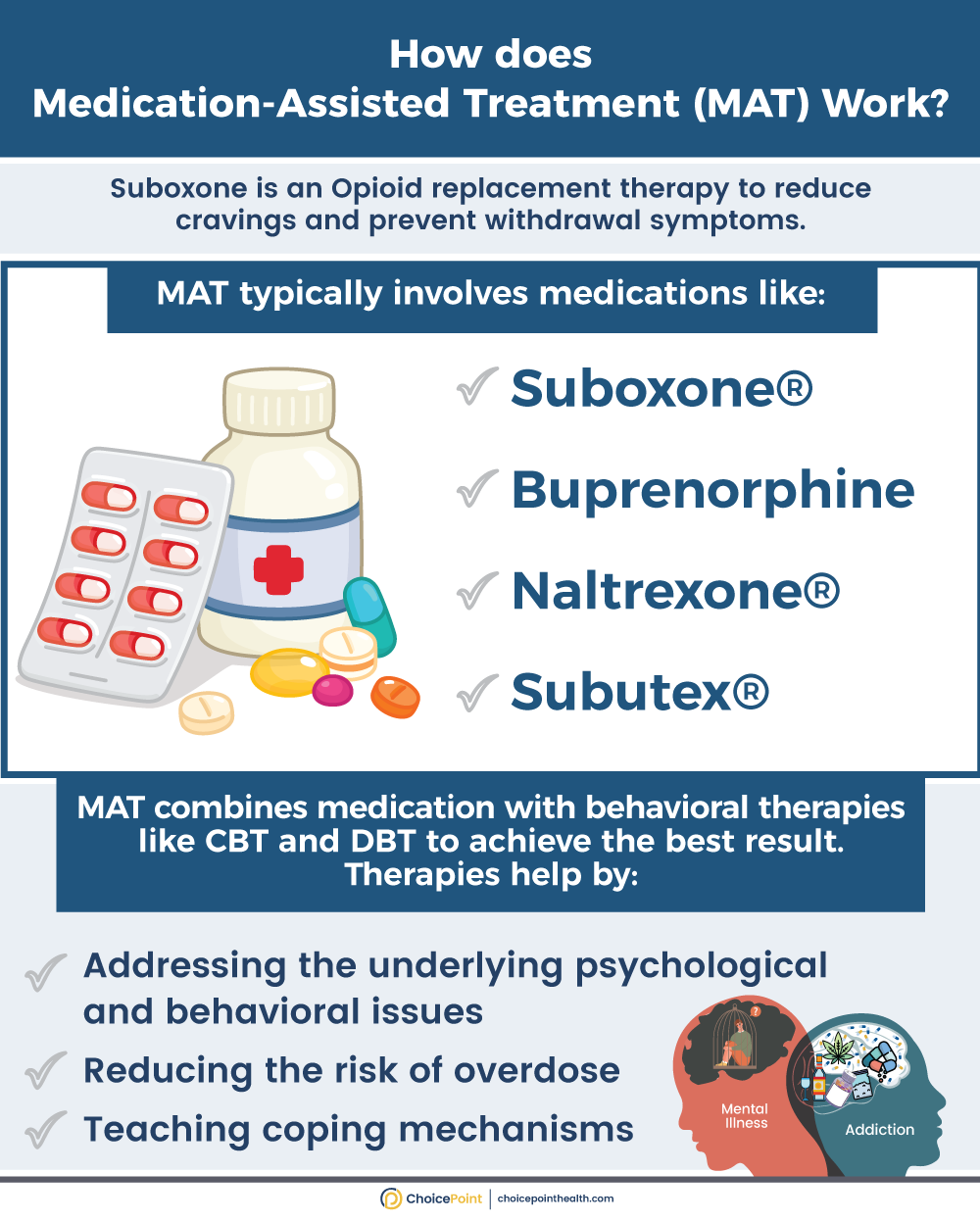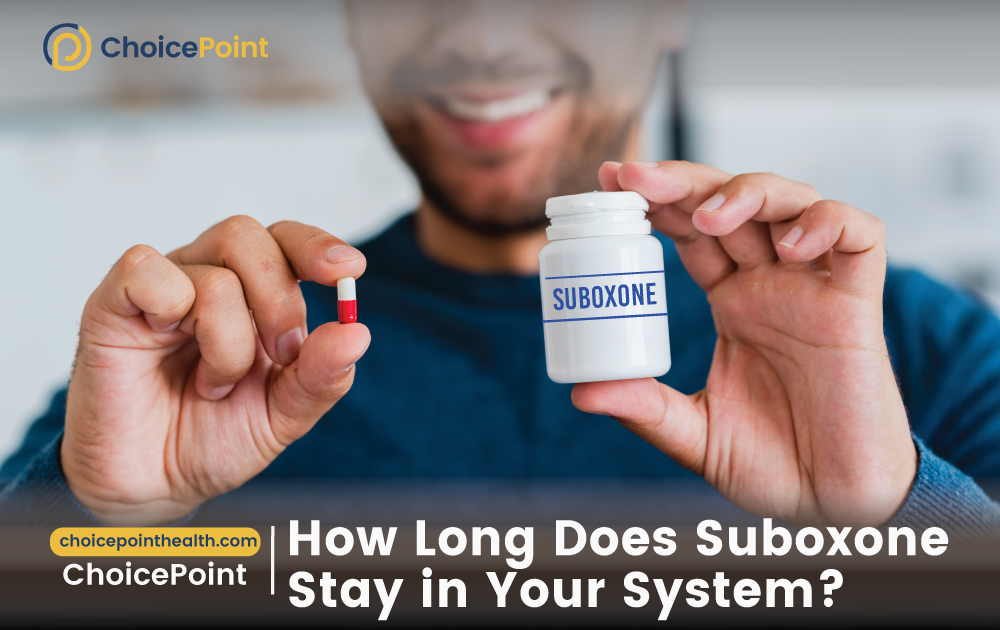According to the National Center for Health Statistics, opioid overdose deaths are still rising, and opioid use disorder is still a significant problem in the United States. Suboxone® (a combination of Buprenorphine and Naloxone®) works together to reduce cravings and relieve withdrawal symptoms. Suboxone® is prescribed during MAT to people suffering from Opioid Use Disorder. Different factors contribute to how long does Suboxone stay in your system, such as dosage, frequency of use, and metabolism. In this article, we will examine these factors in detail and provide comprehensive answers to help you better understand how long does Suboxone stay in your system.
Table of Contents
What Is Suboxone Used For?- 3 Benefits of Using Suboxone®
Suboxone® is a medication used as part of a comprehensive treatment program for opioid addiction that includes counseling and other support services. It is a combination of the following:
- Buprenorphine– a partial opioid agonist that can reduce withdrawal symptoms and cravings for opioids
- Naloxone®– an opioid antagonist that can block the effects of opioids
Suboxone® has many benefits, including:
- It may help people with opioid addiction manage their symptoms without the risk of becoming addicted to the medication itself.
- As buprenorphine is a partial agonist, it produces a less euphoric effect than full opioid agonists like heroin or prescription painkillers. This can make it easier for people to stop using opioids altogether.
- An important tool in treating opioid addiction, It may help people manage their symptoms and reduce the risk of relapse and overdose.
It is critical to mention that Suboxone® should only be used as part of a thorough addiction treatment program that includes counseling and addiction treatment services. It is not a magic pill for opioid addiction and should not be used in isolation. Contact our qualified doctors and schedule an appointment now!
How Is Suboxone Metabolized?
In order to know how long does Suboxone® stay in your system, you need to understand how Suboxone® metabolized. The liver is responsible for metabolizing Suboxone® and Norbuprenorphine (buprenorphine metabolites), which are released due to this metabolization. Norbuprenorphine stays in the bloodstream longer than Suboxone® itself, leaving traces behind.
Half-life of Suboxone®
The half-life of Suboxone® is between 24 and 48 hours. As a result, Suboxone® takes more than a week to leave your system. Because of the half-life of norbuprenorphine, around 150 hours, Suboxone® can still be detected in the body for up to 14 days following use in urine or blood.
How Long Does Suboxone Last?– 6 Factors That Affect Detection Time
How long does Suboxone® stay in your system depends on the individual and their dosage. Generally, the effects can last up to 24 hours or more, so it’s often prescribed to be taken once daily. However, it’s vital to properly follow the doctor’s directives and not adjust your dosage without their guidance. Additionally, risks are associated with long-term use of Suboxone®, such as dependence and withdrawal symptoms when trying to quit. That’s why working closely with your doctor and following their advice is essential to ensure safe and effective treatment.
The effects of Suboxone® may fade away, but Suboxone® may remain in your system for an extended period. The duration varies on a few factors:
a. Body Weight
A high body fat content negatively affects metabolism because a high body weight means a high metabolism rate.
b. Metabolism
Each body has different metabolism rates. Hence each body will break Suboxone® in their own time.
c. Liver Health
A person with a healthy liver may break Suboxone® relatively quicker than someone suffering from some liver health issues.
d. Frequency of Use
If a person has a history of abuse, that may cause build-up in the body and cause Suboxone® to stay a little longer in their system.
e. Dosage
A higher dose of Suboxone may take a little longer to leave a person’s system.
f. Age
As a person ages, metabolism speed decreases. Thus, an older person will process Suboxone® more slowly than a younger person.

What Drugs Are Used for MAT?
How Long Does Suboxone Last in Various Body Parts
Suboxone®’s peak effects normally happen within twenty-four hours after a person takes the sublingual dose. The medicine typically has a half-life of around 30 hours, but if you metabolize it more slowly, it can have a half-life of up to 72 hours (3 days). Here is how long does Suboxone® last in various body parts:
Urine: Up to 3 to 6 days
Hair: Roughly 90 days
Blood: Around 1 to 3 days
Saliva: Up to 3 days
A certified healthcare provider may prescribe Suboxone® to provide medication-assisted treatment (MAT) for opioid addiction. If you or someone you know is looking for DEA-certified addiction specialists near you, call ChoicePoint at 844.445.2563 and schedule an in-person or virtual appointment now!
Speeding Up Suboxone Extraction from Your System
There is no guaranteed way to speed up eliminating Suboxone® from your system at home. However, you can do the following things:
a. Stay Hydrated
Drinking plenty of water and staying hydrated can help flush out the drugs from your system more quickly.
b. Exercise
Regular physical activity can help increase your metabolism and improve blood flow, which can also help eliminate drugs from your system.
c. Having a Good Diet
A stable and nutritious diet can support your body’s natural detoxification process.
d. Get Enough Rest
Adequate rest and sleep are important for your body to repair and recover, which can also help speed up the elimination of Suboxone®.
e. Avoid Alcohol and Other Drugs
Using alcohol or other drugs can slow your body’s natural detoxification process and make it harder to eliminate Suboxone® from your system.
Suboxone Makes Treating Opioid Use Disorder Easier
With over 9 million people abusing Opioids in the US, spreading awareness about treatment methods is vital. Suboxone® treats Opioid dependence. Your healthcare provider may guide you regarding taking a Suboxone® pill or film, keeping your dependence in mind. Suboxone® must be administered under a doctor’s supervision because the effectiveness of treatment depends greatly upon medical, social, and psychological support.
ChoicePoint- A Telehealth MAT Clinic
At ChoicePoint, we offer virtual and in-person Addiction Treatment Programs for people suffering from addiction. Our MAT program includes FDA-approved medications and behavioral therapies to assist long-term recovery. Our MAT program aims to help people reclaim their life after addiction and rebuild a better sober life.
Medical Disclaimer:
ChoicePoint aims to improve the quality of life for people struggling with substance use disorder and mental health issues. Our team of licensed medical professionals research, edit and review the content before publishing. However, this information is not intended to be a substitute for professional medical advice, diagnosis, or treatment. For medical advice please consult your physicians or ChoicePoint's qualified staff.










Review How Long Does Suboxone Stay in Your System?.